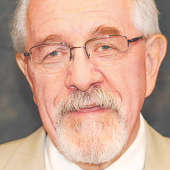- Christmas shopping is done, presents wrapped, strings attached? (12/14/16)
- Cecil is dead and human lives are threatened every day (8/12/15)
- As state flags go, Nebraska's ranks 50th (7/8/15)
- When everything looks like a nail (4/29/15)
- Who remembers to coal slurry pipeline debate? (3/11/15)
- More revelations in Department of Corrections mess (12/17/14)
- The Legislature becomes more Republican (11/19/14)
Opinion
The importance of being vetted
Tuesday, December 17, 2013
"Haste Makes Waste." I have that reminder on a slug of 72 point lead type made on a Ludlow by the first publisher for whom I worked after leaving journalism school 44 years ago.
It showed up on my desk at the Nebraska weekly where I worked after I failed to catch a page proof that resulted in the same grocery store ad running on the back of both sections, at the expense of the second grocery store whose ad didn't appear. It required a 100 mile round trip to the printer to run the second section again. The newspaper delivery was delayed several hours. I learned my lesson. Now I take time to make important decisions.
Perhaps I "vet" those decisions. We hear that word often these days, usually the present participle "vetting" and usually in terms of politics. It means to make a careful and critical examination of something or someone. Synonyms include: examine; scrutinize; investigate; inspect; look over; screen; assess; evaluate; appraise.
Sounds like a lot of work. It was originally a horse-racing term referring to the requirement that a horse be thoroughly checked for health and soundness by a veterinarian before being allowed to race. It is a figurative contraction of veterinarian dating back to the mid 17th century and became a colloquial abbreviation in the 1860s with the verb form meaning to treat an animal.
So what does this have to do with government and politics -- aside from the fact that one often encounters the south end of a north bound horse in such environs. Vetting a candidate is the process of subjecting a person to a series of tests and evaluation before offering them employment. This includes the analysis of a candidate's background to determine if they are well-suited and up to the task.
Vetting -- or the lack thereof -- has made political headlines nationally for years. The selection of running mates or party candidates has been heavily impacted by some of those decisions. It is almost a given that such activity takes place in the political arena. Almost.
One is left to wonder if that happened in the case of Patrick Shannon, the Omaha man who was named by the governor to replace Senator Scott Price who resigned and moved out of state. Shannon's appointment announcement was negated about four hours later when Governor Dave Heineman's office announced that Shannon had withdrawn his name from consideration due to personal, family medical reasons.
Not troubling on its face. Stuff happens. But then came press reports that this man was the same person who had been fined by the Nebraska Accountability and Disclosure Commission for campaign violations during his failed 2004 bid for the Legislature. That triggered criticism from the state Democratic Party (Heineman and Shannon are both Republicans) who sent out a press release saying it was disappointed that the governor cares more about appointing political allies than law-abiding ones.
Shannon is a disabled veteran whom the governor's office called a "fiscal conservative that recognizes the need for tax relief and tax reform." The governor's press release also said he is pro-life and opposes Medicaid expansion and taxpayer-funded benefits for illegal immigrants. In case you missed it, those are exactly the governor's views as well.
So, was Shannon vetted? When asked that question, the governor's office declined to comment.
The governor has since said he'll consider candidates for the seat and make a decision on the appointment soon. The Legislature convenes January 8 and the appointee will serve until January 2015. The seat goes up for election to a two-year term in November 2014.
Let's hope we've all learned the consequences of haste.

